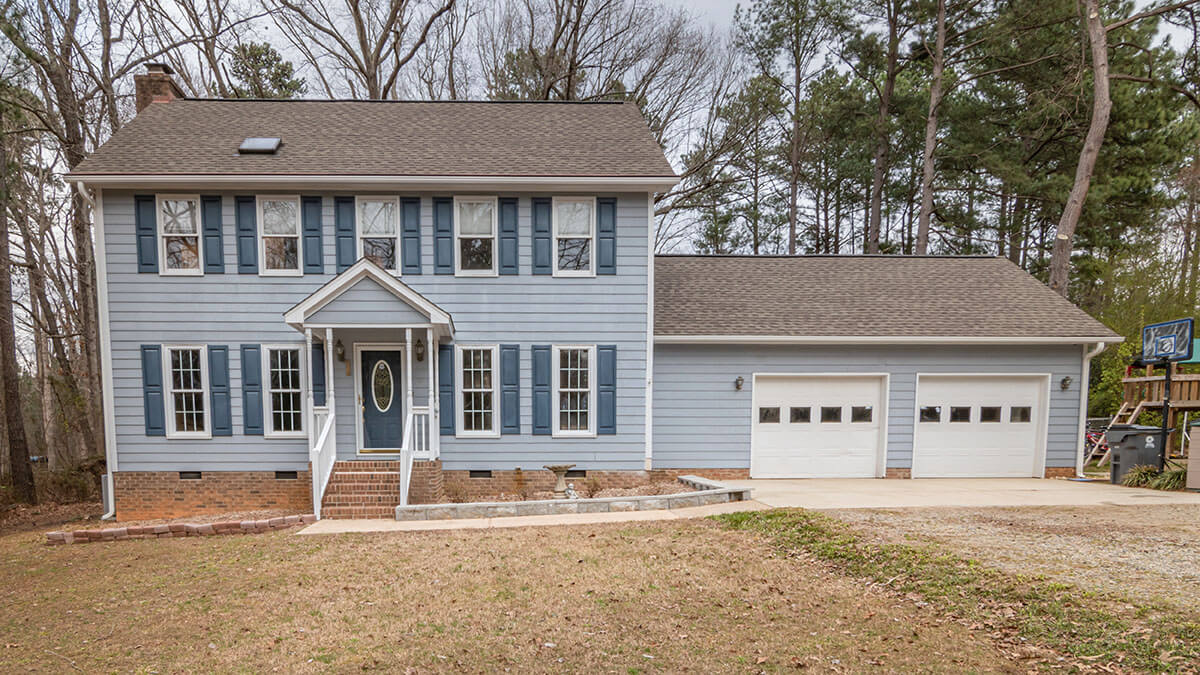Selling a house “as is” can be tempting, especially when you don’t want to deal with the hassle of repairs or upgrades. Maybe your property has been sitting for a while, or you just need a quick sale to move forward with life. Whatever the reason, the appeal of skipping the repair process and getting your home off the market fast is clear. But like any decision, there’s a catch.
While selling as-is can save you time and effort, it often comes at a cost. Many buyers see an “as-is” sale as a red flag, assuming the house needs expensive repairs or has hidden issues. This perception usually results in lower offers, and the financial difference between selling as-is versus investing in a few key repairs can be substantial. But how much do you actually stand to lose?
The good news is, you don’t have to navigate this decision alone. With iBuyer.com, you can get a quick, no-obligation offer that reflects the real value of your property—even in its current state. Before making a decision, though, it’s important to understand the full picture, including both the benefits and the potential downsides.
Selling a Home As-Is
- Exploring “As Is” Home Sales: A Quick Breakdown
- Selling As Is: What Does It Really Mean for Homeowners?
- The Financial Impact of Selling As Is: What’s the Cost?
- Boosting Your Sale Price: Alternatives to Selling As Is
- Weighing Risks and Rewards: Is Selling As Is Worth It?
- Pricing and Marketing Strategies for Your As-Is Home
- Reilly’s Two Cents
- Wrapping It Up: Final Thoughts on Selling As Is
- Common Questions About Selling As Is
- Selling a House As Is: State-by-State Requirements
Compare Cash Offers from Top Home Buyers. Delivered by Your Local iBuyer Certified Specialist.
One Expert, Multiple Offers, No Obligation.
Exploring “As Is” Home Sales: A Quick Breakdown
Selling a home “as is” simply means you’re putting your property on the market without making any repairs or improvements. Whatever condition your home is in right now—that’s what buyers get. It sounds simple and convenient, especially if you don’t want the hassle of dealing with repairs or updates. But while this process might save you time and energy, there’s a financial trade-off to consider.
When buyers see the phrase “as is,” they often assume that the property has serious flaws. This assumption can result in lower offers because buyers factor in the cost of potential repairs or replacements they might need to make. However, for those who need a quick sale or don’t have the budget for repairs, this can be the right choice.
If you’re considering selling as-is but want to avoid the hassle of traditional listings, iBuyer.com can offer you a fast, no-obligation cash offer. This way, you can skip the uncertainty and get a fair price for your home, even without making repairs.
Selling As Is: What Does It Really Mean for Homeowners?
When you sell a house “as is,” it means you’re not responsible for making any repairs after the sale. This can save a lot of headaches, especially if your home needs significant work. But it’s important to understand that selling as-is doesn’t let you off the hook completely. Legally, you’re still required to disclose any known issues with the property. This means if you’re aware of problems like a leaky roof, foundation issues, or outdated electrical systems, you have to inform potential buyers.
The idea behind selling as-is is that the buyer takes the home in its current state, knowing upfront that what they see is what they get. However, failing to disclose known defects can lead to legal issues down the road. Being transparent not only protects you legally but also builds trust with buyers, which can help speed up the sale process.
The Financial Impact of Selling As Is: What’s the Cost?
Selling a home “as is” can result in a significant reduction in sale price. On average, homes sold as-is can go for 10-20% less than comparable properties that have been updated or repaired. Buyers often factor in the cost of repairs and renovations when making their offer, leading to lower offers overall. But just how much you lose depends on a few key factors:
- Market Conditions: In a seller’s market, where demand is high, you might lose less because buyers are more eager to purchase. In a buyer’s market, however, expect lower offers as buyers have more options.
- Location: Homes in high-demand neighborhoods might not experience as much of a price drop. If your home is in a desirable area, buyers may overlook some issues in exchange for the location.
- Condition of the Home: The severity of repairs plays a big role. Major issues like foundation problems or an outdated HVAC system can scare off buyers or lead to very low offers. On the other hand, if your home only needs minor cosmetic fixes, the financial loss might be less severe.
While selling as-is saves time and effort, it’s crucial to weigh these factors to understand what you might be leaving on the table.
Boosting Your Sale Price: Alternatives to Selling As Is
If you’re hesitant about the potential financial loss of selling your home as-is, there are ways to boost your sale price without breaking the bank. A few minor repairs or updates can go a long way in making your home more appealing to buyers. Here are some budget-friendly improvements that can increase your home’s value:
- Painting: A fresh coat of paint, especially in neutral tones, can make your home look cleaner and more modern, instantly adding appeal.
- Landscaping: Curb appeal matters. Simple landscaping fixes like trimming the lawn, adding some plants, or cleaning up the driveway can make a great first impression.
- Small Repairs: Fixing leaky faucets, patching holes in walls, or replacing old light fixtures can make a difference without requiring major investment.
Another option is to offer buyer incentives like covering closing costs or including a home warranty. These small perks can make buyers feel like they’re getting a good deal, even if they’re aware the home needs some work.
These minor improvements can help close the gap between an as-is sale and one that brings in a higher offer.
Weighing Risks and Rewards: Is Selling As Is Worth It?
When deciding whether to sell your home as-is, it’s essential to weigh the pros and cons. While the convenience of selling as-is is undeniable, there are clear trade-offs.
Benefits:
- Quick Sale: Selling as-is allows you to move forward quickly, especially if you need to sell in a short timeframe.
- No Repair Hassles: You avoid the stress, time, and money involved in making repairs or dealing with contractors.
- Attracts Investors: Real estate investors or flippers often seek out as-is homes, so you may find a ready pool of interested buyers.
Risks:
- Lower Offers: Homes sold as-is typically receive lower offers, as buyers account for the potential repair costs.
- Longer Sale Timelines: If the market is slow, an as-is home might sit longer, especially if major repairs are needed.
Ultimately, the decision comes down to your priorities. If a quick, hassle-free sale is more important than getting top dollar, selling as-is might be the right choice. But if you’re willing to invest some time and money into repairs, you could see a higher return.
Pricing and Marketing Strategies for Your As-Is Home
Pricing your as-is home correctly is crucial to attracting the right buyers and avoiding long delays. Setting the price too high can scare off potential buyers, while pricing too low could result in a significant financial loss. Here are a few tips to help you find the sweet spot:
- Know Your Market: Research similar homes in your area that were sold as-is to get a realistic price range. Consider local demand, neighborhood trends, and recent sales.
- Get an Expert Opinion: A real estate agent with experience in as-is sales can help you price your home competitively while still maximizing its value.
- Highlight Unique Features: Even if your home needs repairs, showcase the positives. A great location, large yard, or spacious layout can still be selling points.
When marketing your home, be transparent about its condition while focusing on its potential. Emphasize any unique aspects that set it apart, and be upfront about what needs work. This honesty can attract serious buyers who are prepared to take on a fixer-upper.
Reilly’s Two Cents
Having been through the process of selling a home as-is myself, I understand the hesitation many homeowners feel. It’s not easy to accept a lower offer or to wonder if you’re leaving money on the table. But from my experience, there are a few key strategies that can help ease the process and even boost your bottom line.
First, I highly recommend getting a pre-inspection before listing your home. This gives you a clear understanding of what repairs are needed and can help you avoid any surprises during the buyer’s inspection. With this knowledge, you can decide which fixes are worth doing—or use it to justify your asking price.
Another tip is to negotiate repair costs after inspections, instead of making the fixes upfront. Many buyers will be more willing to work with you on repair credits or price reductions rather than asking for everything to be fixed before the sale. This saves you the upfront expense and hassle of repairs.
Finally, highlight the positive aspects of your home during negotiations. Whether it’s a great location, spacious backyard, or unique architectural details, make sure buyers know what makes your home stand out despite the repairs needed.
Wrapping It Up: Final Thoughts on Selling As Is
Selling a home as-is can be the perfect option for homeowners looking to avoid the hassle of repairs and get a quick sale. However, it’s important to understand that convenience often comes with a financial cost. While selling as-is can save you time and effort, it usually means accepting a lower offer than if you had made a few key repairs or updates.
If you’re considering selling your home as-is, take the time to weigh the pros and cons. Think about your priorities—whether it’s getting the home sold fast or maximizing your profit. Either way, iBuyer.com offers a hassle-free option with a fast, fair offer on your home, allowing you to sell without the uncertainty of traditional listings.
In the end, selling as-is can be a great option if you’re ready to move on quickly, but it’s always worth exploring your alternatives to make sure you’re getting the best deal possible.
Instant Valuation, Confidential Deals with a Certified iBuyer.com Specialist.
Sell Smart, Sell Fast, Get Sold. No Obligations.
Common Questions About Selling As Is
Typically, you can expect to sell your house for about 10-20% less than market value, depending on its condition and the repairs needed.
Yes, even when selling as-is, you are legally required to disclose any known defects or issues with the property. Transparency is key to avoiding legal problems down the road.
Depending on the terms of the contract and any contingencies, you may be able to back out of the sale. It’s important to review the contract carefully with your real estate agent.
Consider low-cost repairs like patching holes in walls, repainting, or minor landscaping. These updates can make your home more appealing to buyers without requiring a major investment.
Selling a House As Is: State-by-State Requirements
Alabama – Sellers must disclose known defects. – Sell as is in Alabama
Alaska – Sellers must disclose known defects. – Sell as is in Alaska
Arizona – Sellers must disclose known defects. – Sell as is in Arizona
Arkansas – Limited disclosure but known issues must be shared. – Sell as is in Arkansas
California – Strict disclosure rules apply. – Sell as is in California
Colorado – Sellers must disclose known issues. – Sell as is in Colorado
Connecticut – Disclosure report required. – Sell as is in Connecticut
Delaware – Full disclosure required. – Sell as is in Delaware
Florida – Known defects must be disclosed. – Sell as is in Florida
Georgia – Caveat emptor, but known material defects must be shared. – Sell as is in Georgia
Hawaii – Detailed disclosure required. – Sell as is in Hawaii
Idaho – Sellers must disclose known issues. – Sell as is in Idaho
Illinois – Property disclosure required. – Sell as is in Illinois
Indiana – Sellers must complete the disclosure form. – Sell as is in Indiana
Iowa – Disclosure form required. – Sell as is in Iowa
Kansas – Sellers must disclose known issues. – Sell as is in Kansas
Kentucky – Disclosure form required. – Sell as is in Kentucky
Louisiana – Known defects must be disclosed. – Sell as is in Louisiana
Maine – Disclosure form required. – Sell as is in Maine
Maryland – Disclosure or disclaimer statement required. – Sell as is in Maryland
Massachusetts – Must disclose known lead paint; other defects must be shared. – Sell as is in Massachusetts
Michigan – Sellers must disclose known issues. – Sell as is in Michigan
Minnesota – Disclosure form required. – Sell as is in Minnesota
Mississippi – Sellers must disclose known defects. – Sell as is in Mississippi
Missouri – Disclosure form required. – Sell as is in Missouri
Montana – Sellers must disclose known issues. – Sell as is in Montana
Nebraska – Disclosure statement required. – Sell as is in Nebraska
Nevada – Sellers must disclose known defects. – Sell as is in Nevada
New Hampshire – Disclosure statement required. – Sell as is in New Hampshire
New Jersey – Known issues must be disclosed. – Sell as is in New Jersey
New Mexico – Disclosure form required. – Sell as is in New Mexico
New York – Sellers must disclose or give a credit. – Sell as is in New York
North Carolina – Disclosure form required. – Sell as is in North Carolina
North Dakota – Sellers must disclose known defects. – Sell as is in North Dakota
Ohio – Disclosure form required. – Sell as is in Ohio
Oklahoma – Disclosure form required. – Sell as is in Oklahoma
Oregon – Disclosure statement required. – Sell as is in Oregon
Pennsylvania – Known defects must be disclosed. – Sell as is in Pennsylvania
Rhode Island – Disclosure form required. – Sell as is in Rhode Island
South Carolina – Disclosure form required. – Sell as is in South Carolina
South Dakota – Sellers must disclose known issues. – Sell as is in South Dakota
Tennessee – Disclosure form required. – Sell as is in Tennessee
Texas – Sellers must disclose known defects. – Sell as is in Texas
Utah – Sellers must disclose known defects. – Sell as is in Utah
Vermont – Disclosure form required. – Sell as is in Vermont
Virginia – Sellers provide a disclaimer but must share known defects. – Sell as is in Virginia
Washington – Disclosure form required. – Sell as is in Washington
West Virginia – Sellers must disclose known issues. – Sell as is in West Virginia
Wisconsin – Disclosure report required. – Sell as is in Wisconsin
Wyoming – Sellers must disclose known defects. – Sell as is in Wyoming
Reilly Dzurick is a seasoned real estate agent at Get Land Florida, bringing over six years of industry experience to the vibrant Vero Beach market. She is known for her deep understanding of local real estate trends and her dedication to helping clients find their dream properties. Reilly’s journey in real estate is complemented by her academic background in Public Relations, Advertising, and Applied Communication from the University of North Florida. This unique combination of skills has enabled her to seamlessly blend traditional real estate practices with cutting-edge marketing strategies, ensuring her clients’ properties gain maximum visibility and sell quickly.
Reilly’s career began with a strong foundation in social media marketing and brand communications. These skills have proven invaluable in her real estate practice, allowing her to offer innovative marketing solutions that set her apart in the industry. Her exceptional ability to understand and meet clients’ needs has earned her a reputation for providing a smooth and satisfying transaction process. Reilly’s commitment to client satisfaction and her innovative approach have garnered her a loyal client base and numerous referrals, underscoring her success and dedication in the field.
Beyond her professional achievements, Reilly is passionate about the Vero Beach community. She enjoys helping newcomers discover the charm of this beautiful area and find their perfect home.
Outside of work, she loves exploring Florida’s stunning landscapes and spending quality time with her family. Reilly Dzurick’s combination of expertise, marketing savvy, and personal touch makes her a standout real estate agent in Vero Beach, Florida.




